最新中考英语复习:初三英语重点句型总结
初三英语重点语法总结中考必备

初三英语重点语法总结中考必备很多同学都想知道一些提升中考英语成绩的方法,大家一起来看看吧。
11、定义:表示经常发生的动作或存在的状态,如能力、特征、性质、身份等。
2、构成 1) be --- is, am, are 2) 实意动词用原形表示 (注意当主语为第三人称单数时,动词 + s或 + es)句型转换 1) 情态动词,联系动词提前或直接在其后加 not 2) 实意动词加do/ does或don't/ doesn't3、用法1) 表示经常性的、习惯性的或永久性的动作,常与always, usually, often, sometimes, every day,twice a month等连用. e.g. Does he usually go to school on foot?2) 表示存在的状态,常用动词be, have, love, like, know, see, hear, think, have, belong to 等。
注意这些动词一般不用被动语态. e.g. He doesn't like music.3) 表示不受时间限制的客观事实或普遍真理. e.g. The earth goes round the sun.一般过去时1、定义:表示过去某一时间内发生的动作或存在的状态,可能是一次的,也可能是经常的,动作已完成。
2、构成 1) be – was,were 2) 实意动词用过去式来表示,没有人称和数的变化。
句型转换 1) was, were 提前或直接加 not 2) 实意动词加did或didn't(动词改为原形)3、用法1) 表示过去某一时间内发生的动作或存在的状态,常与表示过去的时间状语连用 yesterday , last Friday, in 1994, an hour ago, a moment ago, last November, before 1997, on December26, 1976. yesterday morning.2) 表示过去经常或反复发生的动作。
2023年中考英语总复习英语精华知识点全汇总建议收藏
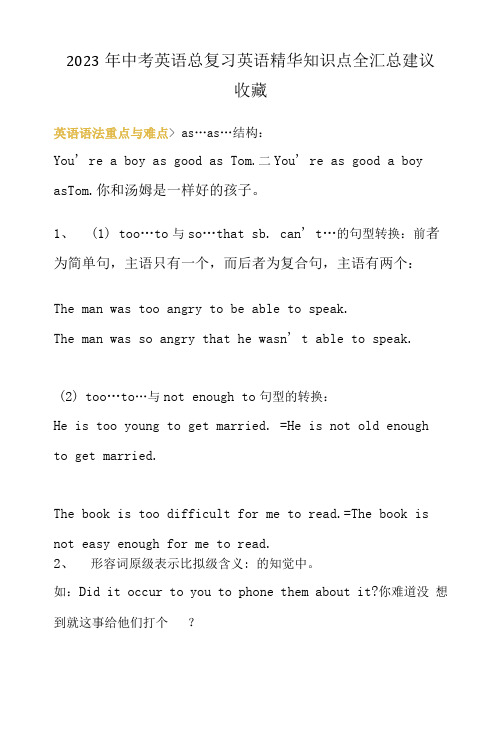
2023年中考英语总复习英语精华知识点全汇总建议收藏英语语法重点与难点> as…as…结构:You' re a boy as good as Tom.二You' re as good a boy asTom.你和汤姆是一样好的孩子。
1、(1) too…to与so…that sb. can' t…的句型转换:前者为简单句,主语只有一个,而后者为复合句,主语有两个:The man was too angry to be able to speak.The man was so angry that he wasn' t able to speak.(2)too…to…与not enough to句型的转换:He is too young to get married. =He is not old enough to get married.The book is too difficult for me to read.=The book isnot easy enough for me to read.2、形容词原级表示比拟级含义: 的知觉中。
如:Did it occur to you to phone them about it?你难道没想到就这事给他们打个?事件作主语时,happen和occur可以通用?如:The accident happened/occurred yesterday. 事故是昨天发生的。
take place指事件发生,但常用来表示“举行”的意思,带有非偶然性?如:The meeting took place last night.会议昨晚举行。
14.in front of, in the front of in front of的意思是“在前面”。
如:There is a tree in front of the house.房子前面有一棵树。
初中英语重点句型、短语(中考必背!)

[短语、词组归纳]由动词开头构成的短语、词组很多。
复习时应分类处理:一、动词+介词1.look at…看…,look like … 看上去像……,look after …照料… 2.listen to…听……3.welcome to…欢迎到……4.say hello to …向……问好5.speak to…对……说话此类短语相当于及物动词,其后必须带宾语,但宾语无论是名词还是代词,都要放在介词之后。
二、动词+副词“动词+副词”所构成的短语义分为两类:A.动词(vt.)+副词1.put on 穿上 2.take off脱下 3.write down记下此类短语可以带宾语,宾语若是名词,放在副词前后皆可;宾语若是人称代词,只能放在副词的前面。
B.动词(vi)+副词。
1.come on赶快 2.get up起床 3.go home回家4.come in进来 5.sit down坐下 6.stand up起立此类短语属于不及物动词,不可以带宾语。
三、其它类动词词组1.close the door2.1ook the same3.go to work/class4.be ill5.have a look/seat6.have supper7.1ook young 8.go shopping 9.watch TV/games10. play games[介词短语聚焦]“介词+名词/代词”所构成的短语称为介词短语。
现将Unitsl-16常用的介词短语按用法进行归类。
1.in+语言/颜色/衣帽等,表示使用某种语言或穿着……。
2.in + Row/ Team/ Class/ Grade等,表示“在……排/队/班级/年级”等。
3.in the morning/ afternoon/ evening/ 表示“在上午/下午/傍晚”等一段时间。
4.in the desk/ pencil-box/bedroom 等表示“在书桌/铅笔盒/卧室里”。
2024年中考英语专项复习句型:定语从句

定语从句1.定义:充当定语作用的从句,用于限制、描绘或说明主句中某一个名词、代词或整个句子。
2.先行词:被定语从句修饰的对象称为先行词。
3.关系词:按定语从句与其先行词的关系,分为:限制性定语从句和非限制性定语从句。
限制性定语从句与其先行词的关系密切,其间不用逗号隔开;非限制性定语从句与其先行词的关系比较松散,其间要用逗号隔开。
5.关系代词引导的限制性定语从句关系代词除了起连接主句和从句的作用外,还在从句中充当主语、宾语、表语、定语等成分。
当关系代词作宾语时,通常可省略。
Eg:The man who/that is standing under the tree is our new English teacher.(作主语)I bought this book(which/that)I thought was interesting.(作宾语)The city is no longer the same as it was.(作表语)Bill doesn’t like the house whose window is broken.(作定语)6.关系副词引导的限制性定语从句关系副词在定语从句中作状语,分别表示时间、地点、原因等。
Eg:I still remember the day when we met for the first time.They booked the hotel where they stayed last summer holiday.The teacher didn’t accept the reason why he was late again.7.非限制性定语从句引导非限制性定语从句的关系代词有as,which,who,whom,whose;关系副词有when 和where.Eg:As we all know,water will turn into ice when the temperature is below zero.My grandpa,who is over eighty,exercises every day.Many people are used to staying up late,which is bad for their health.Jimmy knew the boy,whom I talked with just now.Frank visited a small farm,where his father worked twenty years ago.8.关系代词和关系副词的选择(1)从句缺少成分,则选择关系代词(2)从句不缺成分,则选择关系副词Eg:They talked about the city________the singer held a concert.A.whoseB.thatC.whereD./解析:C.从句不缺成分,因此需选择关系副词where.They talked about the city________was famous as a trade center.A.whoseB.thatC.whereD./解析:B.从句缺少主语,因此需选择关系代词,且根据句意应选择that.9.关系代词that和which用法辨析that和which在定语从句中都可指物,且可作主语或宾语。
九年级英语中考冲刺短语及句型总结(全)

九年级英语中考冲刺短语及句型总结(全)九年级英语中考冲刺短语及句型总结(全)一、知识点1.Check in : 在旅馆的登记入住。
Check out: 在旅馆结账离开。
2.By: ①通过…..方式(途径)。
例:I learn English by listening to tapes.②在…..旁边。
例:by the window/the door③乘坐交通工具例:by bus/car④在……之前,到……为止。
例:by October在10月前⑤被例:English is spoken by many people.3.how与what的区别:how通常对方式或程度提问,意思有:怎么样如何,通常用来做状语、表语。
what通常对动作的发出者或接受者提问,意思为什么,通常做宾语,主语。
①How is your summer holiday? It’s OK.(how表示程度做表语)②How did you travel around the world? I travel by air.③What do you learn at school? I learn English, math and many other subjects.① What…think of…? How…like…?② What…do with…? How…deal with…?③ What…like about…? How…like…?④ What’s the weather like today? How’s the weather today?⑤ What to do? How to do it?e.g. What do you think of this book?=How do you like this book?I don’t know what I should do with the matter.=I don’t know how I should deal with it.What do you like about China?=How do you like China?I don’t know what to do next step?=I don’t know how to do it next step?㊣ What good / bad weather it is today!(weather为不可数名词,其前不能加 a )㊣ What a fine / bad day it is today! (day为可数名词,其前要加 a )4. aloud, loud与loudly的用法: 三个词都与"大声"或"响亮"有关。
中考英语必备句型汇总(初三英语经典句型)
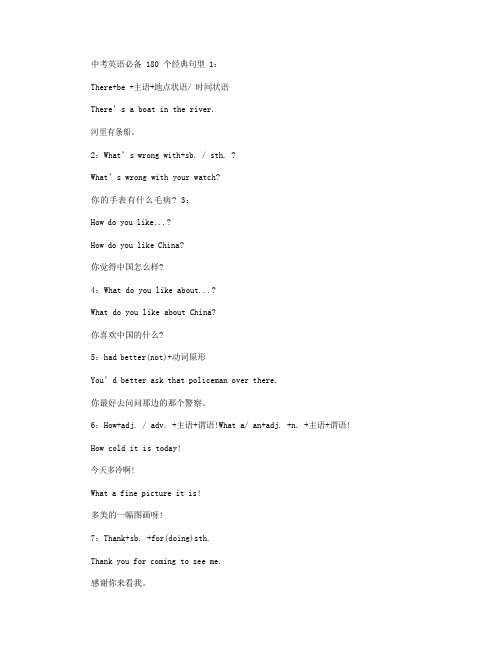
中考英语必备 180 个经典句型 1:There+be +主语+地点状语/ 时间状语There’s a boat in the river.河里有条船。
2:What’s wrong with+sb. / sth. ?What’s wrong with your watch?你的手表有什么毛病? 3:How do you like...?How do you like China?你觉得中国怎么样?4:What do you like about...?What do you like about China?你喜欢中国的什么?5:had better(not)+动词原形You’d better ask that policeman over there.你最好去问问那边的那个警察。
6:How+adj. / adv. +主语+谓语!What a/ an+adj. +n. +主语+谓语! How cold it is today!今天多冷啊!What a fine picture it is!多美的一幅图画呀!7:Thank+sb. +for(doing)sth.Thank you for coming to see me.感谢你来看我。
8:So+be/ 情态动词/ 助动词+主语He is a student. So am I.他是一个学生,我也是。
9:... not ... until ...He didn’t have supper until his parents came back.直到他的父母回来他才吃饭。
10:比较级+and+比较级The baby cried harder and harder.那孩子哭得越来越厉害。
11:the +比较级,the +比较级The more one has,the more one wants.越有越贪。
12:... as + adv.+as ...…not as(so) +adj. / adv. +as ...Do you think that art is as important as music?你认为艺术和音乐一样重要吗?Last Sunday the weather was not so wet as it is today.上个星期天的天气不如今天的天气潮湿。
初中三年英语语法知识归纳最全的中考英语语法大全汇总

一.句子结构及句型1.简单句:由一个主语和一个谓语组成的句子。
2.并列句:由两个或多个相互独立的简单句连接而成的句子。
3.复合句:由一个主句和一个或多个从句连接而成的句子。
4.疑问句:用来提问的句子,常以助动词、系动词或情态动词开头。
5.祈使句:用来表示命令、请求、建议等的句子。
6.感叹句:表示强烈的感情、情绪或意义的句子。
二.时态的用法1.一般现在时:表示经常性或客观事实。
2.一般过去时:表示过去一些时间发生的动作或状态。
3.现在进行时:表示现在进行或暂时的动作。
4.过去进行时:表示过去时进行或暂时的动作。
5.将来时:表示将来要发生的动作或存在的状态。
三.语态的用法1.一般现在时的被动语态:主语是动作的承受者。
2.一般过去时的被动语态:主语是动作的承受者。
3.现在进行时的被动语态:主语是动作的承受者。
4.过去进行时的被动语态:主语是动作的承受者。
四.动词的用法1.及物动词:必须接宾语才能构成完整的意思。
2.不及物动词:不需要接宾语就能构成完整的意思。
3.能愿动词:包括情态动词和行为动词,用于表示能力、愿望、可能性等。
五.名词的用法1.可数名词:表示可以数的事物或物体。
2.不可数名词:表示不可数的抽象概念、物质或一类事物。
3.可数名词的数量表示:使用具体数字、数词、不定代词等。
六.代词的用法1.主格代词:在句子中作主语或表语。
2.宾格代词:在句子中作宾语或介词宾语。
3.物主代词:表示所有关系,用来修饰名词。
4.反身代词:表示动作反映到自己身上。
七.形容词的用法1.表示性质或特征的词汇。
2.修饰名词或代词。
3.用比较级和最高级表示程度或比较。
八.副词的用法1.表示时间、地点、方式、程度等。
2.修饰动词、形容词、副词和句子。
九.介词的用法1.表示时间、地点、方式不同的介词。
2.用于修饰名词或代词。
十.连词的用法1. 并列连词:连接两个并列的分句,如and, but, or等。
2. 从属连词:连接主句和从句,如when, because, if等。
初三英语重点知识归纳

初三英语重点知识归纳一、词汇1. 重点单词- 动词- achieve:达到;完成;成功。
例如:You can achieve your dreams if you work hard.(如果你努力工作,你就能实现你的梦想。
)- suggest:建议;提议。
suggest doing sth.(建议做某事),如:I suggest going for a walk.(我建议去散步。
)- remain:保持;依然;留下。
例如:She remained silent.(她保持沉默。
)- 名词- success:成功;成功的人或事。
形容词形式为successful,副词形式为successfully。
例如:His success made him famous.(他的成功使他出名了。
) - pollution:污染。
例如:Air pollution is a serious problem.(空气污染是一个严重的问题。
)- invention:发明;创造。
例如:The invention of the telephone changed our lives.(电话的发明改变了我们的生活。
)- 形容词- confident:自信的;有信心的。
be confident of sth.(对某事有信心),如:He is confident of passing the exam.(他有信心通过考试。
) - dangerous:危险的。
名词形式为danger。
例如:It is dangerous to swim in this river.(在这条河里游泳是危险的。
)- active:积极的;活跃的。
例如:He is an active student in class.(他在课堂上是一个积极的学生。
)2. 词汇拓展- able(形容词,能够的) - ability(名词,能力) - enable(动词,使能够)。
中考英语必考重要句型总结

中考英语必考重要句型总结1. It's+adj.+for sb.+to do sth. 对某人来说做某事怎么样,如:It is dangerous for children to play in the street. 孩子们在街上玩是很危险的。
2. It's time for sth. 是干某事的时间了;It's time(for sb.)to do sth.该干某事了。
如:①It's time for the meeting. 该开会了。
②It's time for us to go to school. 我们该上学了。
3. It takes sb. some time to do sth.做某事花某人一些时间。
sb. spend some time/money on sth./(in)doing sth. 某人花时间(金钱)在某事上/花时间(金钱)干某事。
sth. cost sb. some money 某事花某人一些钱。
pay some money for sth.为某事(物)付钱。
如:① It took me two hours to write the letter. 写这封信花了我两小时的时间。
② He spends half an hour(in)reading English every morning.他每天早上花半小时读英语。
③ He spends one hour on the housework every day. 他每天花一小时做家务。
④ The bike cost me 500 yuan. 这辆自行车花了我500元。
⑤ I spent 500 yuan on the bike. 我买这辆自行车花了500元。
⑥ I paid 500 yuan for the bike. 我花了500元买这辆自行车。
重要提示:cost主语一般为物;spend, pay主语一般为人。
九年级英语中考复习必背重点短语句型

九年级英语中考复习必背重点短语句型九年级英语中考复习必背重点短语句型Unit1How can we become good learners?重点短语1. good learners 优秀的学习者2. work with friends 和朋友一起学习3. study for a test 备考4.have conversations with 与……交谈5.speaking skills 口语技巧6.a little 有点儿7.at first 起初起先8.the secret to... .......的秘诀9.because of 因为10.as well 也11.look up 查阅;抬头看12.so that 以便,为了13.the meaning of ……的意思14.make mistakes 犯错误15.talk to 交谈16.depend on 依靠依赖17.in common 共有的18.pay attention to 注意关注19. connect …with …把……联系20.for example 例如21.think about 考虑22.even if 即使尽管纵容23.look for 寻找24.worry about 担心担忧25.make word cards 制作单词卡片26.ask the teacher for help 向老师求助27.read aloud 大声读28.spoken English 英语口语29.give a report 作报告30.word by word 一字一字地31. so……that 如此……以至于32.fall in love with 爱上33.something interesting 有趣的事情34.take notes 记笔记35.how often 多久一次36.a lot of 许多37.the ability to do sth. 做某事的能力38.learning habits 学习习惯39.be interested in 对……感兴趣40.get bored 感到无聊重点句型1.提建议的句子:①What/ how about +doing sth.? 做…怎么样?如:What/ How about going shopping?②Why don't you + do sth.? 你为什么不做…?如:Why don't you go shopping?③Why not + do sth. ? 为什么不做…?如:Why not go shopping?④Let's + do sth. 让我们做…吧。
中考英语复习专题常见强调句型最全总结
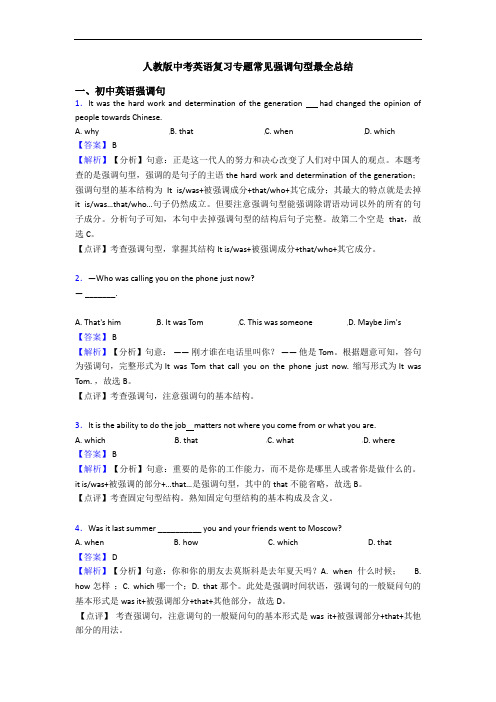
人教版中考英语复习专题常见强调句型最全总结一、初中英语强调句1.It was the hard work and determination of the generation had changed the opinion of people towards Chinese.A. whyB. thatC. whenD. which【答案】 B【解析】【分析】句意:正是这一代人的努力和决心改变了人们对中国人的观点。
本题考查的是强调句型,强调的是句子的主语the hard work and determination of the generation;强调句型的基本结构为It is/was+被强调成分+that/who+其它成分;其最大的特点就是去掉it is/was…that/who…句子仍然成立。
但要注意强调句型能强调除谓语动词以外的所有的句子成分。
分析句子可知,本句中去掉强调句型的结构后句子完整。
故第二个空是that,故选C。
【点评】考查强调句型,掌握其结构It is/was+被强调成分+that/who+其它成分。
2.—Who was calling you on the phone just now?— _______.A. That's himB. It was TomC. This was someoneD. Maybe Jim's【答案】 B【解析】【分析】句意:——刚才谁在电话里叫你?——他是Tom。
根据题意可知,答句为强调句,完整形式为It was Tom that call you on the phone just now. 缩写形式为It was Tom. ,故选B。
【点评】考查强调句,注意强调句的基本结构。
3.It is the ability to do the job matters not where you come from or what you are.A. whichB. thatC. whatD. where【答案】 B【解析】【分析】句意:重要的是你的工作能力,而不是你是哪里人或者你是做什么的。
中考英语语法重点句型79句知识点
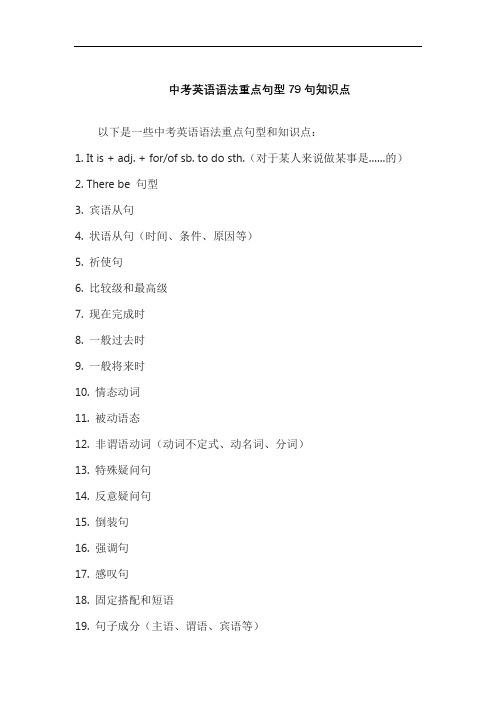
中考英语语法重点句型79句知识点以下是一些中考英语语法重点句型和知识点:1. It is + adj. + for/of sb. to do sth.(对于某人来说做某事是……的)2. There be 句型3. 宾语从句4. 状语从句(时间、条件、原因等)5. 祈使句6. 比较级和最高级7. 现在完成时8. 一般过去时9. 一般将来时10. 情态动词11. 被动语态12. 非谓语动词(动词不定式、动名词、分词)13. 特殊疑问句14. 反意疑问句15. 倒装句16. 强调句17. 感叹句18. 固定搭配和短语19. 句子成分(主语、谓语、宾语等)20. 冠词的用法21. It is + adj. + for/of sb. to do sth.(对于某人来说做某事是……的)22. There be 句型23. 宾语从句24. 状语从句(时间、条件、原因等)25. 祈使句26. 比较级和最高级27. 现在完成时28. 一般过去时29. 一般将来时30. 情态动词31. 被动语态32. 非谓语动词(动词不定式、动名词、分词)33. 特殊疑问句34. 反意疑问句35. 倒装句36. 强调句37. 感叹句38. 固定搭配和短语39. 句子成分(主语、谓语、宾语等)40. 冠词的用法41. It is + adj. + for/of sb. to do sth.(对于某人来说做某事是……的)42. There be 句型43. 宾语从句44. 状语从句(时间、条件、原因等)45. 祈使句46. 比较级和最高级47. 现在完成时48. 一般过去时49. 一般将来时50. 情态动词51. 被动语态52. 非谓语动词(动词不定式、动名词、分词)53. 特殊疑问句54. 反意疑问句55. 倒装句56. 强调句57. 感叹句58. 固定搭配和短语59. 句子成分(主语、谓语、宾语等)60. 冠词的用法61. It is + adj. + for/of sb. to do sth.(对于某人来说做某事是……的)62. There be 句型63. 宾语从句64. 状语从句(时间、条件、原因等)65. 祈使句66. 比较级和最高级67. 现在完成时68. 一般过去时69. 一般将来时70. 情态动词71. 被动语态72. 非谓语动词(动词不定式、动名词、分词)73. 特殊疑问句74. 反意疑问句75. 倒装句76. 强调句77. 感叹句78. 固定搭配和短语79. 句子成分(主语、谓语、宾语等)。
中考复习:英语重点句型总结(there be)

中考复习:英语重点句型总结(there be)1. 基本结构There be +主语 + 地点 /时间状语。
如:There is a computer in the room. 房间里有一台电脑。
There are two TV plays every evening. 每晚有两场电视剧。
2. 主谓一致要采取就近一致原则,和* 近be的主语一致。
如:There is a pen, two rulers in the box. 盒子里有一只钢笔,两把尺子。
There are two boys and a teacher at the school gate. 门口有两个男孩,一个老师。
3. 主语后的动词形式在there be 句型中,主语与动词是主动关系时用现在分词;是被动关系时用过去分词。
如:There is a purse lying on the ground. 地上有一个钱包。
There are five minutes left now. 现在还有5分钟。
4. 反意疑问句反意疑问句应与there be对应,而不是依据主语。
如:There is a radio on the table, isn’t there? 桌子上有一台收音机,是吧?There are more than fifty classes in your school, aren’t there?你们班有50多名学生,是吧?5. there be 与have的替换there be表示所属时可与have替换。
There is nothing but a book in my bag. =I have nothing but a book in my bag.包里只有一本书。
6. there be后接不定式时常用主动形式表示被动意义。
如:There is a lot of work to do. 有许多工作要做。
注意:当该句型主语是something, anything, nothing等不定代词时,后面的不定式用主动形式或被动形式,意义各不同。
2024年中考英语一轮复习形容词和副词的比较级最高级句型和注意点总结与练习
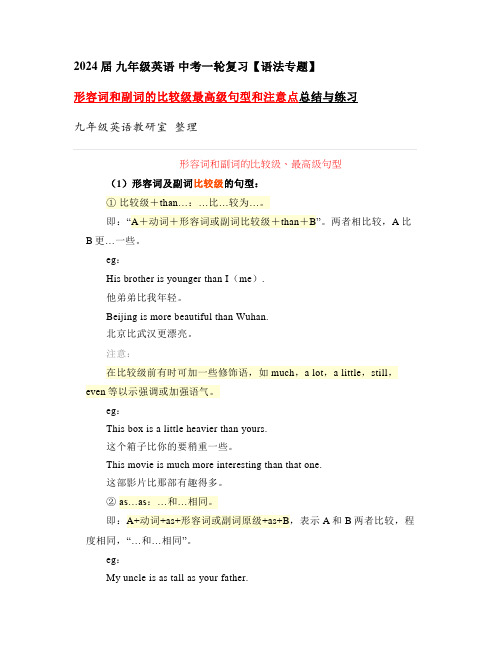
2024届九年级英语中考一轮复习【语法专题】形容词和副词的比较级最高级句型和注意点总结与练习九年级英语教研室整理形容词和副词的比较级、最高级句型(1)形容词及副词比较级的句型:①比较级+than…:…比…较为…。
即:“A+动词+形容词或副词比较级+than+B”。
两者相比较,A比B更…一些。
eg:His brother is younger than I(me).他弟弟比我年轻。
Beijing is more beautiful than Wuhan.北京比武汉更漂亮。
注意:在比较级前有时可加一些修饰语,如much,a lot,a little,still,even等以示强调或加强语气。
eg:This box is a little heavier than yours.这个箱子比你的要稍重一些。
This movie is much more interesting than that one.这部影片比那部有趣得多。
②as…as:…和…相同。
即:A+动词+as+形容词或副词原级+as+B,表示A和B两者比较,程度相同,“…和…相同”。
eg:My uncle is as tall as your father.我叔叔和你父亲一样高。
My dog is as old as that one.我的狗与那个狗一样大。
③ A+not+as+形容词或副词原级+as+B,表示A,B两者程度不同,即“A不如B那么…”。
eg:My uncle is not as tall as your father.我叔叔不如你父亲高。
Tom is not as honest as John.汤姆不如约翰诚实。
He can't run as /so fast as you.他没你跑得快。
④“比较级+ and +比较级”或“more and more +原级(多音节词和部分双音节词)”,意为“越来越…”。
eg:Our city is more and more beautiful.我们的城市越来越美丽了。
中考英语100句重点句型
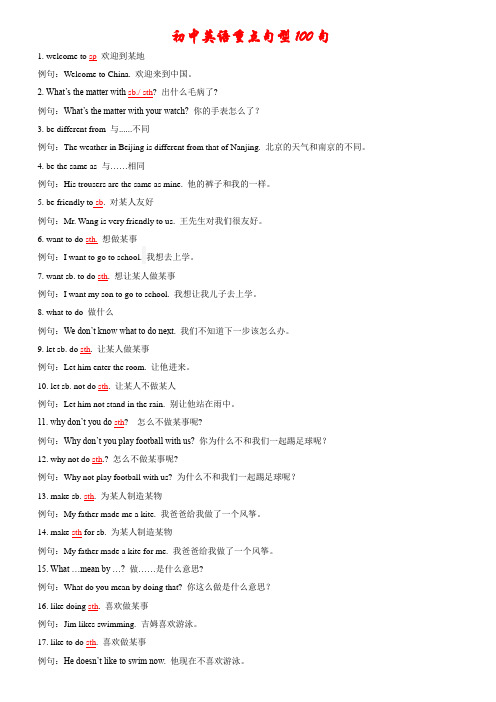
初中英语重点句型100句1. welcome to sp欢迎到某地例句:Welcome to China. 欢迎来到中国。
2. What’s the matter with sb./ sth? 出什么毛病了?例句:What’s the matter with your watch?你的手表怎么了?3. be different from 与......不同例句:The weather in Beijing is different from that of Nanjing. 北京的天气和南京的不同。
4. be the same as 与……相同例句:His trousers are the same as mine. 他的裤子和我的一样。
5. be friendly to sb. 对某人友好例句:Mr. Wang is very friendly to us. 王先生对我们很友好。
6. want to do sth.想做某事例句:I want to go to school.我想去上学。
7. want sb. to do sth. 想让某人做某事例句:I want my son to go to school. 我想让我儿子去上学。
8. what to do 做什么例句:We don’t know what to do next.我们不知道下一步该怎么办。
9. let sb. do sth. 让某人做某事例句:Let him enter the room. 让他进来。
10. let sb. not do sth. 让某人不做某人例句:Let him not stand in the rain. 别让他站在雨中。
11. why don’t you do sth?怎么不做某事呢?例句:Why don’t you play football with us?你为什么不和我们一起踢足球呢?12. why not do sth.? 怎么不做某事呢?例句:Why not play football with us? 为什么不和我们一起踢足球呢?13. make sb. sth. 为某人制造某物例句:My father made me a kite. 我爸爸给我做了一个风筝。
中考英语重点句型归纳

中考英语重点句型归纳**中考英语重点句型归纳**1. “It's + adj. + (for sb.) to do sth.”这个句型超级重要哦。
它的意思就是“(对某人来说)做某事是……的”。
比如说,“It's difficult for me to learn English well.”(对我来说学好英语是困难的)。
就像爬山,山很高,要爬到山顶不容易,学好英语就像爬这座高山一样,这个句型就很好地表达出这种感觉。
你难道不觉得这个句型很实用吗?2. “too...to...”结构。
意思是“太……而不能……”。
例如,“He is too young to go to school.”(他太小了以至于不能去上学)。
这就好比一个小杯子,想装一大桶水,根本装不下嘛。
你想啊,如果不掌握这个句型,很多类似这样表达“能力不足”的情况就很难准确说出来,多可惜呀!3. “not...until...”,“直到……才……”。
像这个句子“I didn't go to bed until my mother came back.”(直到我妈妈回来我才上床睡觉)。
这就像在等待一个信号,信号不来,就一直等,就像在车站等一辆很重要的车,车不来就不能出发一样。
你在生活中肯定也有很多这样等待的情况,这个句型能很好地描述呢。
4. “both...and...”,表示“两者都……”。
比如“Both Tom and Jerry like ice cream.”(汤姆和杰瑞都喜欢冰淇淋)。
这就像两个好朋友,他们有着共同的喜好,只要一提到冰淇淋,两个人都会眼睛放光。
如果描述两个人或者两件事物有相同的情况,这个句型就派上大用场了。
5. “either...or...”,“要么……要么……”。
例如,“You can either come wit h me or stay here.”(你要么跟我来,要么就呆在这儿)。
九年级中考英语知识点总结

九年级中考英语知识点总结一、词汇。
1. 重点单词。
- 动词。
- be动词(am/is/are/was/were):用于表示主语的状态(是……)。
例如:I am a student.(一般现在时);He was at home yesterday.(一般过去时)。
- have/has(had):表示“有”或完成时态中的助动词。
如:She has a book.(一般现在时);They have finished their work.(现在完成时)。
- do/does(did):可作助动词用于构成疑问句和否定句,也可作实义动词表示“做”。
例如:Do you like English?(一般现在时的一般疑问句);He did his homework last night.(一般过去时)。
- 名词。
- 可数名词:有单复数形式。
如:book - books,student - students。
规则变化一般在词尾加 -s或 -es(以s、x、ch、sh结尾的加 -es等),不规则变化需要特殊记忆,如:man - men,child - children。
- 不可数名词:没有复数形式,如:water,rice,information等。
表示数量时,用量词,如:a glass of water,two pieces of information。
- 形容词和副词。
- 形容词用于修饰名词,如:a beautiful flower。
副词用于修饰动词、形容词或其他副词,如:He runs quickly.;She is very beautiful. 形容词和副词的比较级和最高级:- 规则变化:一般在词尾加 -er(比较级)、-est(最高级);以重读闭音节结尾且词尾只有一个辅音字母的,双写该辅音字母再加 -er、-est;以“辅音字母 +y”结尾的,把y变为i再加 -er、-est。
例如:big - bigger - biggest;hot - hotter - hottest;easy - easier - easiest。
九年级英语重点句型句式归纳总结
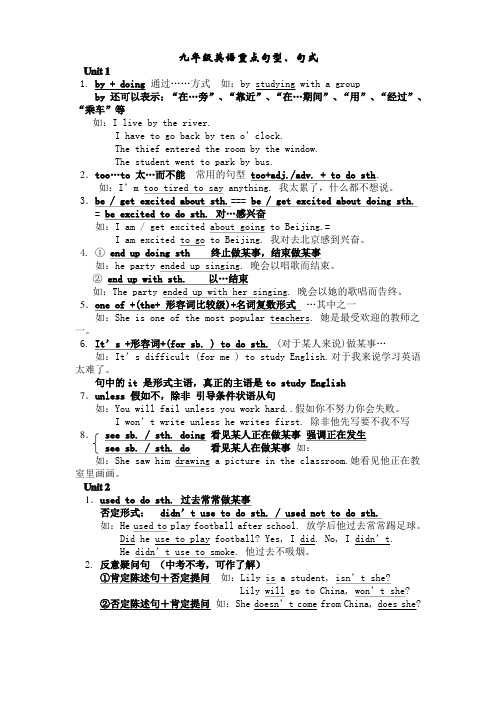
九年级英语重点句型、句式Unit 11.by + doing通过……方式如:by studying with a groupby还可以表示:“在…旁”、“靠近”、“在…期间”、“用”、“经过”、“乘车”等如:I live by the river.I have to go back by ten o’clock.The thief entered the room by the window.The student went to park by bus.2.too…to太…而不能常用的句型too+adj./adv. + to do sth.如:I’m too tired to say anything.我太累了,什么都不想说。
3.be / get excited about sth.===be / get excited about doing sth.=be excited to do sth.对…感兴奋如:I am / get excited about going to Beijing.=I am excited to go to Beijing.我对去北京感到兴奋。
4.①end up doing sth终止做某事,结束做某事如:he party ended up singing.晚会以唱歌而结束。
②end up with sth.以…结束如:The party ended up with her singing.晚会以她的歌唱而告终。
5.one of +(the+形容词比较级)+名词复数形式…其中之一如:She is one of the most popular teachers.她是最受欢迎的教师之一。
6.It’s +形容词+(for sb. ) to do sth. (对于某人来说)做某事…如:It’s difficult (for me ) to study English.对于我来说学习英语太难了。
初三英语知识点归纳总结及例题
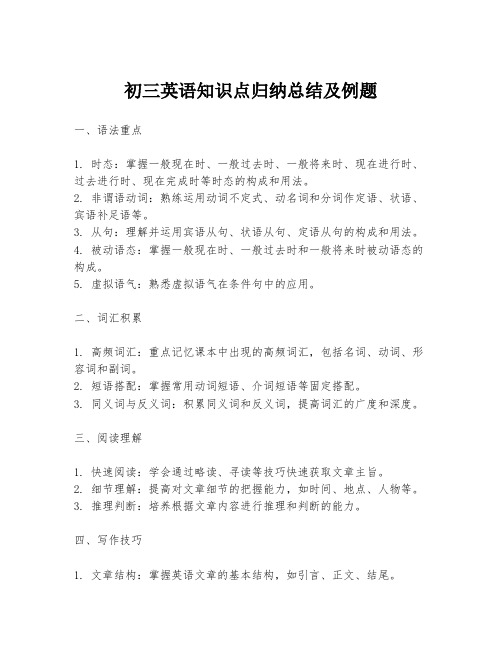
初三英语知识点归纳总结及例题一、语法重点1. 时态:掌握一般现在时、一般过去时、一般将来时、现在进行时、过去进行时、现在完成时等时态的构成和用法。
2. 非谓语动词:熟练运用动词不定式、动名词和分词作定语、状语、宾语补足语等。
3. 从句:理解并运用宾语从句、状语从句、定语从句的构成和用法。
4. 被动语态:掌握一般现在时、一般过去时和一般将来时被动语态的构成。
5. 虚拟语气:熟悉虚拟语气在条件句中的应用。
二、词汇积累1. 高频词汇:重点记忆课本中出现的高频词汇,包括名词、动词、形容词和副词。
2. 短语搭配:掌握常用动词短语、介词短语等固定搭配。
3. 同义词与反义词:积累同义词和反义词,提高词汇的广度和深度。
三、阅读理解1. 快速阅读:学会通过略读、寻读等技巧快速获取文章主旨。
2. 细节理解:提高对文章细节的把握能力,如时间、地点、人物等。
3. 推理判断:培养根据文章内容进行推理和判断的能力。
四、写作技巧1. 文章结构:掌握英语文章的基本结构,如引言、正文、结尾。
2. 句型运用:灵活运用各种句型,使文章表达更加丰富。
3. 逻辑连贯:注意文章的逻辑连贯性,使用恰当的连接词。
例题:语法填空The movie "The Lion King" is a popular animated film. Ittells a story about a young lion named Simba who becomes the king of the jungle after his father's death. Simba was bornin a royal family, but he was not always (1) ________ (responsible). He was curious and playful, always gettinginto trouble. One day, his father, Mufasa, took him to thetop of a hill to show him the kingdom. Mufasa told Simba that everything the light touches is their kingdom and he would be the king one day. However, Simba's uncle, Scar, was jealous and wanted to be the king. He (2) ________ (plan) to kill Mufasa and Simba to take the throne. After Mufasa's death, Simba was blamed for the tragedy and ran away from home. He met two friends, Timon and Pumbaa, who taught him to live a carefree life. But eventually, Simba realized his (3)________ (responsibility) and returned to the kingdom tofight against Scar and reclaim his rightful place as the king. 答案:1. responsible2. planned3. responsibility通过以上知识点的归纳总结和例题的练习,希望能帮助初三学生更好地掌握英语知识,提高英语水平。
初三英语基本知识点总结
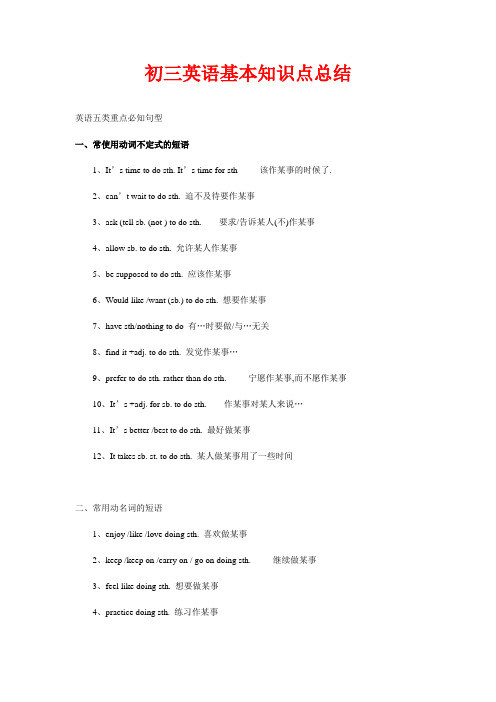
初三英语基本知识点总结英语五类重点必知句型一、常使用动词不定式的短语1、It’s time to do sth. It’s time for sth 该作某事的时候了.2、can’t wait to do sth. 迫不及待要作某事3、ask (tell sb. (not ) to do sth.要求/告诉某人(不)作某事4、allow sb. to do sth. 允许某人作某事5、be supposed to do sth. 应该作某事6、Would like /want (sb.) to do sth. 想要作某事7、have sth/nothing to do 有…时要做/与…无关8、find it +adj. to do sth. 发觉作某事…9、prefer to do sth. rather than do sth. 宁愿作某事,而不愿作某事10、It’s +adj. for sb. to do sth.作某事对某人来说…11、It’s better /best to do sth. 最好做某事12、It takes sb. st. to do sth. 某人做某事用了一些时间二、常用动名词的短语1、enjoy /like /love doing sth. 喜欢做某事2、keep /keep on /carry on / go on doing sth. 继续做某事3、feel like doing sth. 想要做某事4、practice doing sth. 练习作某事5、give up doing sth. 放弃作某事6、be good at/ do well in doing sth. 擅长作某事7、pay attention to doing sth. 注意作某事8、what about/ how about doing sth.….怎么样(好吗)?9、Thank you for doing sth. 为…感谢某人10、mind doing sth. 介意作某事11、be used for doing sth./ be used to do sth. 被用来作某事12、spend …(in) doing sth. 花时间作某时13、be busy doing/ with sth. 忙于作某事14、finish doing sth. 作完某时15、look forward to doing. 盼望做某事16、prefer doing sth. to doing sth. 喜欢…胜过…17、be/get used to doing sth. 习惯作某事18、keep / stop/ prevent sb. from doing sth.阻止某人作某事三、省略动词不定式的短语1、一看二听三使役see/ hear/ feel/ notice/ look at /listen to sb. do sth.看见/听见/感觉/注意某人作某事make /let /have sb. do sth. 使/让某人做某事2、help sb. (to) do sth/ with sth.帮助某人作某事3、had better (not) do sth. 最好(不)做某事4、Why don’t you/ not do sth.为什么不作某事5、Would /Will / Could you please (not) do sth.请你(不)作某事好吗?四、同义词比较1、stop to do sth. 停下正在做的事去作另一件事stop doing sth. 停止正在作的事eg. When the teacher came into the classroom, the students stopped talking. After he worked for an hour, he stopped to have a rest.2、forget / remember to do sth.忘记/记得要去作某事forget / remember doing sth. 忘记记得曾经做过某事eg. Please remember to bring my book to school.I remember doing my homework3、used to do sth. 过去常常作某事be used to do sth. 被用来作某事be used to doing sth. 习惯于作某事eg. My father used to smoke.Wood is used to make paper.I am used to getting up early.4、So +be/助动词/情态动词+ 主语…也一样So +主语+be/助动词/ 情态动词是呀,表示赞同别人的观点Neither + be /助动词/ 情态动词+主语…也不一样(用于否定句)eg. He has been to Beijing. So have I.It’s a fine day. So it is.She doesn’t like eggs. Neither do I.5、too…to do sth. 太…而不能…so +adj. /adv + that(从句) 如此…以致…such +(a/an +adj.)+n.+ that(从句)如此…以致…(not) enough (for sb.) to do sth. (对某人来说)做某事(不)够eg. The boy is too young to go to school.The boy is so young that he can’t go to school.He is such a young boy that he can’t go to school.The boy is not old enough to go to school.五、常考知识点1、keep +adj. 保持…状态keep (sb.) doing sth. 继续做某事/使某人老是做某事eg. Everyone should keep our classroom clean.It’s too late, but he still keeps working.Lily always keeps us waiting for her.2、make + n. 使某人成为make + sb. + adj. 使某人…make sb. do sth. 使某人做某事Sb. be made to sth. 某人被迫做某事eg. We made Peter our monitor.Books make us happy.He often makes me laugh.The workers were made to work 12 hours a day.3、I don’t think that... 我认为…不eg. I don’t think you are right.4、It’s /was/has been+ some time +since+一般过去时…自从…以来有多久了eg. It has been two years since we met last time.6、What do you mean by/ What does .. mean?是什么意思?eg. What do you mean by “computer”?/What does “computer”mean?7、What do you think of…/How do you like …?你认为…怎么样?eg. What do you think of this film /How do you like this film?。
- 1、下载文档前请自行甄别文档内容的完整性,平台不提供额外的编辑、内容补充、找答案等附加服务。
- 2、"仅部分预览"的文档,不可在线预览部分如存在完整性等问题,可反馈申请退款(可完整预览的文档不适用该条件!)。
- 3、如文档侵犯您的权益,请联系客服反馈,我们会尽快为您处理(人工客服工作时间:9:00-18:30)。
Ask sb to do要求某人做某事Ask sb not to do要求某人不要做某事Ask for要求Ask about sth问关于某事Tell sb to do告诉某人做某事Tell sb not to do告诉某人不要做某事Tell stories讲故事Tell jokes讲笑话Tell the truth说实话Help sb (to) do帮助某人做某事Help sb with sth在某事上帮助某人Want to do想要做某事Make sb do使某人做某事Let sb do让某人做某事Like doing喜欢做某事Like to do喜欢做某事Give up doing放弃做Mind doing介意做Miss doing错过做Enjoy doing喜欢做worth doing值得做Consider doing考虑做Practice doing联系做Keep doing保持做Favor doing宠爱做Fancy doing想象做Finish doing完成做Feel like doing喜欢做Have difficulty doing做...有困难Have fun doing玩的开心Have a good time doing玩的开心Hope sb do希望某人做某事Be busy doing忙于做某事Be busy with sth忙于某事Play with sth/sb与某人、某事玩Agree to do同意做某事Agree with sb同意某人Agreee to sth同意某事Decide to do决定做某事Decide on sth决定某事Be determined to do决定做某事Determine to do决定做某事Dislike to do不喜欢做某事Dislike doing不喜欢做某事Love to do喜欢做某事(从心里)Be interested in sth对某事感兴趣Discuss with sb与某人讨论Discuss about sth讨论某事Teach sb to do sth教某人做某事Give sb sth给某人某物Give sth to sb个某人某物Learn from sb/sth从某人/某事学到Listen to听Wait for sb等某人Find sb doing找到...正在做Feel sb doing感觉到...正在做Listen to ... Doing听到...正在做Hear doing听到...正在做See doing看到...正在做Watch doing看到...正在做Look at ... doing看到...正在做Feel do感觉...做Listen to sb do听到...做Hear do听到...做See do看到...做Watch do看到...做Look at ... do看到...做Stop to do停止去做Stop doing停止做Start to do开始做(主语不是人)Start doing开始做Begin to do开始做Begin doing开始做Try to do努力做Try doing尝试做Forget to do忘记做Forget doing忘记做过Remember to do记住做Remember doing记住做过Work as作为...工作Work for为...工作Work in在...工作(大地点)Work at在...工作(小地点)Be good at擅长Be good for有利于Be good with对...好Be bad at不擅长Be bad for不利于Be bad with对...不好Be friendly to对...友好Be unfriendly to对...不友好Fight with sb与某人打架Die of死于Have no right to do没有权利做There be sb/sth doing有某人/某物正在做Need to do需要做Have to do不得不做Should do应该做Do some doing最一些...Disagree to do不同意做Disagree to sth不同意某事Disagree with sb不同意某人A waste of sth浪费某物Thanks for doing谢谢做...Thanks to sb谢谢某人No doing不要做Prep + doing介词后面加doingIt is + adj + to do做......样It is + adj + for sb to do对于某人做... ...样It takes time/money for sb to do花费某人时间/金钱做It takes time/money to do花费时间/金钱做It took time/money for sb to do花费某人时间/金钱做It took time/money to do花费时间/金钱做(过去)Had better do最好做Had better not do最好不要做Help oneself请自便Help doing情不自禁做(can't)Stand doing(无法)忍受做Talk with与某人谈话Talk to对某人谈话Talk about谈论Buy sb sth给某人买东西Buy sth for sb为某人买东西Buy sth from 从...买东西Lend sth to sb借给某人某物Lend sb sth借给某人某物Borrow sb sth某人借用某物Borrow sth from sb某人借用某物Live in住在(大地点)Live at住在(小地点)Stay at呆在Arrive at到达(小地点)Arrive in到达(大地点)Put on穿上Put off脱下Keep order维持秩序Join in加入Take part in加入Be proud of为...而骄傲Set out离港Say goodbye to对...说再见Say morning to对...说早上好Look for寻找Take care of照顾Take care保重Look after照顾Pay attention注意Make up one's mind决定Drive sb + adj把某人逼到...Be mad at sb对某人生气Be mad with sth对某人生气Be determined not to do决定不要做Dream of/about梦到Complain of/about抱怨Hear from/of来信Protect from保护Differ from区别Be different from区别Believe in相信Live on靠...为生Live as作为...生活Complain to sb对某人抱怨Complain about sth抱怨某事Would rather do(A)then do(B)宁愿A 也不要BPrefer doing(A)to doing(B)宁愿A也不要B每个单元的重点句型九年级1-15单元重点句型复习Unit 31. Sixteen-year-olds should be allowed to drive.2. He doesn’t seem to have many friends. =It seems that he doesn’t have many friends. =He seems not to have many friends.3. They talk instead of doing homework.4. A: We have a lot of rules at my house.B: So do we.So +助动词/情态动词/be +主语。
So+主语+助动词/情态动词/be.5. But I’m not allowed to get my ears pierced yet.6. What’s the reason? =Why?7. I’m not allowed to go out on school nights, either.8. The other day, my friends and I talked about the rules that we have in school.9. The problem is that all my classmates think the uniforms are ugly.10. Our teachers believe that if we did that, we would concentrate more on our clothes than our studies.If +主语+过去式(be用were),主语+would +V.11. That would be a good way to keep both teachers and students happy.12. Longer vacations would give us time to do things like volunteering.13. Teenagers often think they should be allowed to practice their hobbies as much as they want.14. It’s a very difficult dream to achieve.Unit 41. He doesn’t know what to wear. =He doesn’t know what he will wear.2. I don’t know if he should bring a present.3. If I were you, I’d wear a shirt and tie.4. I’m too tired to do well. = I’m so tired that I can’t do well.He isn’t old enough to go to school. =He is too young to go to school.5. You like talking to one or two people rather than to a group. rather than=instead of6. You would also rather stay at home and read a good book than go to a party. Would rather…than…7. prefer to do… rather than do…8. You must always hide medicine from children.Unit 51. Whose guitar is this? It might belong to Alice. =be Alice’s2. What do you think “anxious” means?3. She’s worried because of her test.4. These days, strange things are happening in our neighborhood.5. There must be something visiting the homes in our neighborhood.might, would, +vmust , +be sb/sb’scan’t +/be +adj/v-ingUnit 61. I love music that I can sing along with/dance to.2. I prefer music that has great lyrics.3. I love singers, who write their own music.4. He’s made some great movies over the years.5. It does have a few good features.6. Some of her best loved photos are on display in this exhibition.7. I see the same things every day and they don’t interest me as much.8. Whatever you do, don’t miss this exhibition.9. As the name suggests, the band has lots of energy.10. I’m lucky to be here for my six-month English course.11. I’m not sure what to expect.12. But I prefer not to eat too much food that is fried.13. The main thing is to have a good balance.Unit 71. I love places where the people are really friendly.2. I like places where the weather is always warm.3. There’s not much to do there.4. –Where would you like to visit? –I’d like/love to… or I hope to…5. For your next vacation, why not consider visiting Paris?6. Traveling around Paris by taxi can cost a lot of money.7. So unless you speak French yourself, it’s best to travel with someone who can translate things for you. Unless=if…not…8. But any kind of exercise is fine.9. The room needs to be big enough for three people.10. It seems some students would like to start work as soon as possible, so they can help provide better lives for their parents.11. But many students reported that they were willing to work hard to achieve their dreams.Unit 81. Hui Ping loves to read, and she puts this love to good use by working in the after-school care center at her local elementary school.2. Not only do I feel good about helping other people, but I get to spend time doing what I love to do.3. You could help coach a football team for little kids.4. On Monday he told a radio interviewer that he had run out of money to buy old bikes.5. The strategies that he came up with worked out fine.6. For sure, you have made it possible for me to have “Lucky”.7. I cant’ use my arms or legs well.8. I feel very lucky to have him.Unit 91. I think the telephone was invented before the car.2. It was invented by Chelsea Lanmon.3. Who were they invented by?4. It gives people more time to work and play every day.5. Although tea wasn’t brought to the western world until 1610. not…until…6. Some leaves from a nearby bush fell into the water and remained there for some time.7. Basketball was invented by a Canadian doctor named James Naismith, who was born in 1861.8. Knocking into players and falling down would be dangerous.9. It’s believed that on December 21st, 1891, the first basketball game in history was played.It’s said that… It’s reported…Unit 101. What happened? What’s happening? what has happened?2. By the time she got to class, the teacher had already started teaching.3. When she got to school, she realized she had left her backpack at home.4. I’ve never been late for school, but yesterday I came very close.5. I had to wait for him to come out.6. Luckily, my friend Tony and his dad came by in his dad’s car and they gave me a ride.7. I only just made it to my class.8. Welles was so convincing that hundred of people believed the story.9. Many people ran to their local supermarket to buy as much spaghetti as they could. They could=possible10. That little joke didn’t have a very happy ending.Unit 11情态动词的不定式:1. The ground must be just right - neither too wet nor too dry. it's best to plant trees inspring because it's warmer.2. Make sure that it is straight.3. Put the tree in the hole next to the stick so that it is straight.4. Tie the tree to the top of the stick to keep it straight.5. Forests help to keep water from running away, so drought does not often happen. Lesson 42 的第一段。
